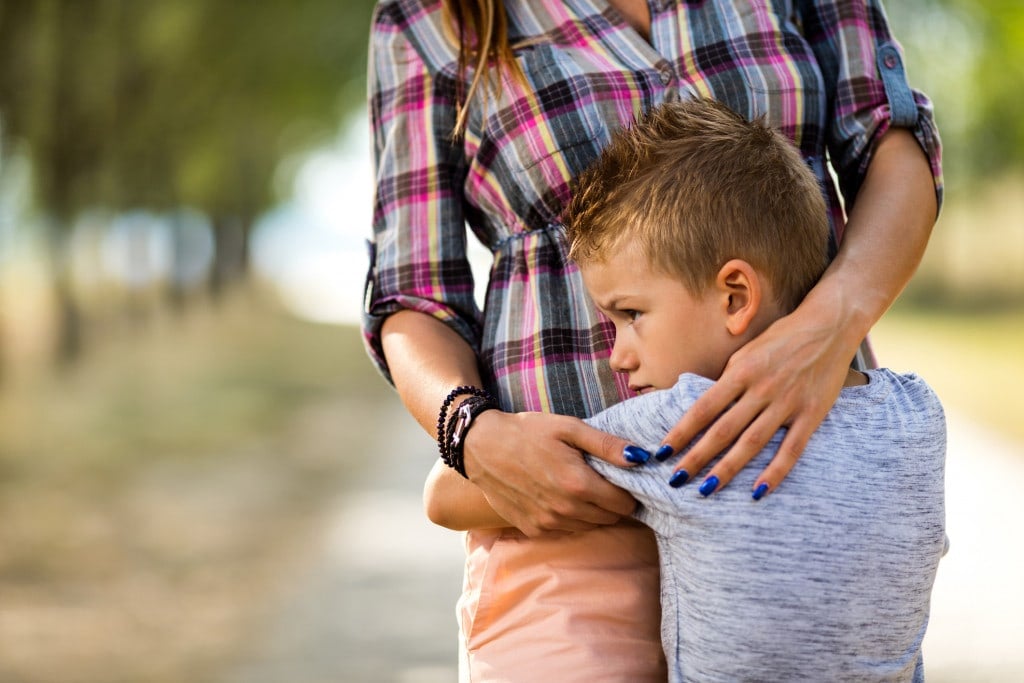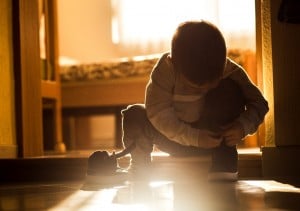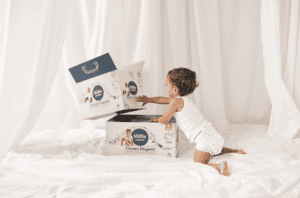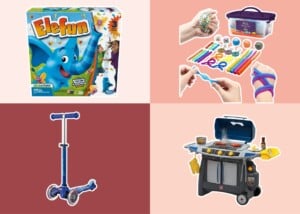Anxiety is when you feel worried or scared that something terrible could happen to you. Certain types of worries or fears are developmentally normal in children. For instance, babies often experience separation anxiety because they have learned their primary attachment figure (usually a parent) can leave them, and they feel insecure about when (or even if) that person will return.1
As our children get older, their imaginations develop, and they have very normal fears and anxieties, like being worried about the dark, monsters, or other supernatural things. Or, they could be scared of new or high-stress situations, like starting school, going to their first sleepover, or speaking in public. As parents, we must know how to help our children navigate these uncomfortable and scary feelings. Read on to learn about anxiety in children and coping strategies that can help an anxious child.
What Does Anxiety Look Like in Children?
Anxiety is often coupled with physical sensations in the body — shaking, sweating, and having an upset tummy or butterflies in the stomach, to name a few.7 However, anxiety in children can look different than that of a grown-up.1 This is mainly because our little ones don’t yet have the language or knowledge to label what they feel in their bodies as “worry” or “anxiety.” We are more likely to hear from a child that they feel sick in their stomach, have a sore tummy, or have a headache. We might also witness tantrums, nail-biting, bedwetting, trouble sleeping, etc., rather than having them verbally express why they feel afraid (or even what they are scared of).1,2
How Are Anxiety Disorders Diagnosed?
It’s normal for everyone to feel anxious at some point, and these feelings may come and go and not last too long. However, anxious feelings differ from a formal diagnosis of an anxiety disorder. So, how can you tell if your child is experiencing normal worries or something more?
Even if you think your little one might have anxiety, only a health professional can diagnose anxiety disorders. They will use the Diagnostic and Statistical Manual of Mental Disorders, 5th Edition (DSM-5) to diagnose your child. Here are some things they will look for (for Generalised Anxiety Disorder):3
- The person’s worries are excessive and relate to several events, situations, or activities (it’s not just one thing that triggers their fears)
- The symptoms have been happening on more days than not for longer than six months
- The person finds it hard to control their worries
- They experience at least three of the following symptoms:
- Being restless or on edge
- Feeling easily tired/fatigued
- Having trouble concentrating/focusing
- Being irritable
- Experiencing muscle tension
- Having difficulty falling or staying asleep or their sleep is restless
- Their symptoms cause distress and interfere with their quality of life (relationships, school, etc.)
- They don’t have another medical issue or diagnosis that can appear similar to anxiety or result in the same kind of symptoms
15 Strategies To Help Your Child Cope With Anxiety
These strategies can help a child better cope with anxiety:
1. Talk About Feelings Often
Anxiety in children may happen when they feel they cannot talk to someone about their worries. Younger kids might not have the words to describe what is happening to them or verbalize their fears, so making sense of their internal experience helps them feel more safe and in control.2
Things can become less scary once they are talked out. Create conversations with your kids from a young age that encourage them to talk about their feelings, good and bad. As they get older, continually ask them about their feelings to remind them you are a safe place to air their grievances.
2. Help Them Face Their Fears
A child may become anxious about something new or unknown. Showing them their fear is only due to this can help them overcome their negative feelings. For example, if they become anxious at the playground, show them they can’t get hurt on the swing if they use it safely. Something this simple can help a child recover from anxious thoughts.
Just be careful not to invalidate them or brush off their fears. The fear might not be founded in reality, but the feeling is real. You could say, “I can see that you feel worried. Let’s talk about it.”
3. Get Physical
Even as adults, not moving enough can often lead to internalized anxiety and depression.4 Encourage your kids to get physical in ways that appeal to them. For instance, if they love sports, set time aside daily for them to run around or kick a soccer ball. You can also find other ways to get physical, like jumping on a trampoline or helping around the house.
4. Practice Mindfulness
We hear about mindfulness a lot these days for ourselves, but it is also a great idea to practice with your kids. Have them take 10 minutes out of their day to sit together and meditate. You can use an app on your phone to help guide you through mindfulness techniques. Those 10 minutes will go a long way in teaching them how to cope with stressful situations in the future.8
5. Refocus Their Attention
If your child is young and experiencing anxiety or distress, try to refocus them. Show them their favorite toy or bring them outside to pick up sticks. This can work with older children, too — if your child feels anxious over a test or an event coming up, try to keep their mind off it by playing their favorite game or cooking a meal together.
6. Embrace the Imagination
Teach your children to close their eyes and imagine their favorite place when anxiety happens. Have them describe it out loud in detail until they can calm down. Younger children may benefit from counting to 20 or reciting their ABCs. This refocuses their brain and helps them think about something other than their current worry or fear.
7. Teach Them Breathing Techniques
Simple breathing techniques can make all the difference when it comes to anxiety.9 Teach your kids how to breathe deeply when they feel anxiety coming on. Start by having your child breathe in for 10 seconds and out for another 10 seconds until they feel a sense of calm.
8. Create a Calm Space
If your child experiences anxiety often, creating a calm space in your home can help them disconnect from those negative feelings. Consider putting up a tent filled with pillows and calming colors, or create a comfy spot in a corner of the playroom with their favorite books where they can go whenever they feel anxious.
9. Listen to a Story
Refocusing the mind is the basis of many coping strategies, and stories are a great way to disconnect from our thoughts. Download children’s podcasts that your child would enjoy, or use a storytelling app. Television can often add to their distress, but listening forces them to use their imaginations, creating less mental space for anxious thoughts.
10. Encourage Journaling (Or Doodling)
Older children may benefit from journaling. This allows them to write about their days or create a fictional story. Younger children can get the same benefit of journaling by doodling or coloring.
11. Write Down Their Fears
Fear often comes from the unknown. Writing down our worries can make them seem less scary. When your child is anxious, have them write down their feelings and read them back to you or themselves.
12. Create a Specified “Worry Time”
If your child seems to experience anxiety daily, create “worry time” in their day. Take 10 minutes to have them write down or discuss their worries and fears. When those 10 minutes are up, have them say goodbye to those fears and concerns and say you will revisit them (if needed) tomorrow.
13. Give Hugs
Giving hugs is a simple (but possibly the most effective) coping strategy.10 If your child feels anxious, a hug can do wonders for their psyche. You may also want to teach your children how to hug themselves. Self-care can go a long way in coping with their anxiety as they get older.
14. Take a Long Walk
Fresh air and exercise are two things we always have available to us. When anxiety hits, get your child outside. Take a long walk with them around your neighborhood or at a local park. If the weather isn’t cooperating, taking them on a long drive can have the same effect.
15. Embrace the Magic of Water
Surprisingly, a cold glass of water can help ease anxious thoughts.5 When we splash ourselves with cold water or drink something icy cold, we trick our minds into focusing on something other than anxiety. Cold water provides a physical distraction, and our children’s minds must decide what to focus on and process.6 Plus, dehydration can worsen our feelings, so make sure your little one stays hydrated.5
Research also says “icing” or “cooling” the vagus nerve helps reduce our heart rate. This is because the vagus nerve is part of the nervous system, which is responsible for either feeling calm and relaxed or getting ready for danger/fears (fight, flight, and freeze).6 A hot shower or a cold bath in the middle of the day can also help calm nerves.
These coping strategies may help your anxious child, but they can’t replace a formal diagnosis of anxiety or support from a trusted health professional. If you are worried about how your child is feeling or how they express themselves, things have changed from how they usually act or behave, or you need support or further strategies for your child, please consult with your doctor, pediatrician, or mental health professional.































